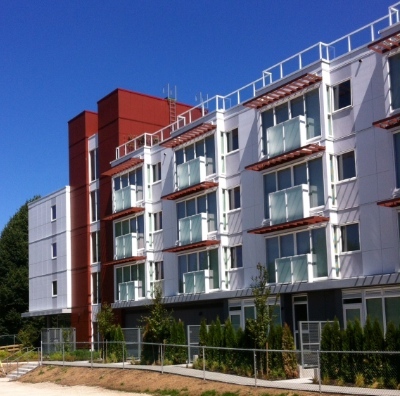
This fall, seniors will be moving into 53 new independent living homes in More Than a Roof’s Little Mountain project.
Some 60 years ago, more than 200 social housing units were built in the shadow of Vancouver’s picturesque Little Mountain. As the years passed, the housing became more difficult to maintain; it was time to replace those aging structures.
Enter More Than a Roof (MTR).
This fall, several dozen low income seniors will be moving into 53 new independent living homes in MTR’s Little Mountain project, now rushing to completion. The project is the first group of a total of 234 one-bedroom and two-bedroom apartments that will replace the 50s project.
The property will ultimately include many more units; the end product will involve a mixture of social and market housing. Much of the support for the not-for-profit social component will come in large part from the sale of some of the Little Mountain land to developers.
Holborn Properties is the overall developer of the Little Mountain complex, by agreement with the provincial government and the City of Vancouver.
In the words of a recent joint statement from the three entities: “Redevelopment will allow for a better use of the land and encourage a mixed-income and diverse neighbourhood, with modern, subsidized housing that is fully integrated into the larger business and residential community.”
And the net effect of property sales related to the Little Mountain project will be the release of substantial funds to other social housing projects.
The release adds: “The province is investing all of the net proceeds from the sale of the site into social housing throughout BC, with 50 percent of the proceeds targeted for Vancouver. In addition to the 234 new units at Little Mountain, proceeds will be invested in the 2,100 new supportive housing units being built around the province, 1,500 of which are in Vancouver.”
Lorne Epp, MTR executive director says the Christian agency has developed substantial experience in working with government, churches, developers and community leaders in several parts of British Columbia over the past few years.
Originating as an arm of Mennonite Central Committee, MTR evolved into a stand-alone organization with a related foundation. It has developed 11 housing projects – nine in the Metro Vancouver, and two outside, in Victoria and Prince George.
Lorne points to five steps MTR utilizes in implementing its projects and working with the people the agency wants to help. “They are the ‘More’ in ‘More Than a Roof,’” he explains.
Those steps are:
- Reducing poverty – including use of financial education programs and other means to help tenants in stabilizing not only their income but their economic position.
- Improving health – mental, physical and spiritual as appropriate. That includes helping tenants to cope with trauma resulting from, for example, immigration issues or family conflict.
- Building networks of support within the community and beyond.
- Rekindling personal hope – which has often been snuffed out through traumatic situations.
- Encouraging conflict resolution – overcoming depression, which often involves a careful step-by-step process.
In addition, Lorne described six values which help shape the way in which the agency does its work.
“All of these values and strategies are centred on doctrinal themes that are broadly woven through the Christian scripture. It is my hope and prayer that through our work, we might ‘let our light shine before men’ in a Matthew 5:16 kind of way that our postmodern culture can understand,” he says.
Those values involve:
- Recognition of the significance of the individual.
- Building of community, both with the tenants and the MTR support base.
- Cultivating of relationships as a key factor in both the recognition of the individual and building of community.
- Practicing generosity – with time, money, skills – on a voluntary basis.
- Sharing the basics of the Christian faith.
- Doing business well, with excellence in relationships with donors, employees, suppliers and the people we serve (the tenants).
An article in the June 1, 2013 Mennonite Brethren Herald, written by Simon Lewchuk, described the development of MTR:
Started almost 30 years ago by two Christian real estate developers who realized the desperate need for more affordable housing in and around Vancouver, MTR (first incorporated as MCC Housing) built its first affordable housing project in 1986.
Today, MTR has successfully built 10 affordable housing communities, providing homes to some 1,100 people, including single mothers, people with severe chronic mental illness and those struggling with addiction.
Although MTR has cultivated close business relationships with external stakeholders and various levels of government to secure funding, land and regulatory approval, they work closely with local churches and continue to be inspired and led by a deep Christian faith.
“We care about homeless people because Christ cares,” says MTR executive director Epp. “Jesus always responded to extreme human need around him with respectful compassion, generosity, dignity and care. . . . As Christians, we’re called to embody a message that profound change is possible, to bring light to darkness. For the tenants we do life with, we have a 24-hour opportunity to embody the gospel.”
Lee Anne Michayluk, managing director for MTR’s downtown projects, wrote the proposal that won the agency’s Little Mountain participation.
“The site is a 15.2 acre area is located next to Queen Elizabeth Park. It is close to Riley Park, Hillcrest Community Centre and a vibrant shopping district on Main Street,” she says. “The development area is an L-shaped parcel of land, located between Main and Ontario Streets and from 33rd Avenue to 37th Avenue.”
But it is more than that, Michayluk adds. It is a 10-minute walk to the Canada Line, handy to one of Canada’s most scenic parks and within easy distance, potentially, of some of the best non-major league baseball.
Phase One – the project now moving toward completion – is a five-storey, 53-unit building for seniors offering non-market housing at the Little Mountain site.
Some of the building’s features are:
- 47 one-bedroom units.
- Six two-bedroom units.
- A diversity of welcoming spaces including a ground-floor amenity room and terrace for social gatherings.
- An expansive rooftop deck that includes a community garden.
- Bicycle and scooter storage area.
Michayluk also has a ready list of Christian agencies that are helping to bring a human scale to the project. They are:
- Soulkitchen: Urban mission investing in areas of hospitality, service and training people in effective and confident communication, and unlocking generosity and creative ideas so they participate in a healthier and more vibrant community
- Columbia Bible College: Their Urban Mission Dynamics class offers volunteers on a quarterly basis to serve the residents and the community through practical assistance and relationship building.
- St. Peter’s Fireside: Meals, game nights and other recreation activities to foster relationship building and community development.
- A Rocha: A community garden network helping with garden bed design for accessibility for seniors and establishing a gardening club.
- City Gate Leadership Forum: Fully funded community kitchen project addressing nutrition, social isolation and food security for seniors.



The laudatory coverage of More Then A Roof (MTR) ‘s participation in the Little Mountain redevelopment lacks critical perspective and leaves the reader content but misinformed. Lloyd Mackey unfortunately lends credence to our government’s less then honest version of the facts behind this historic transfer of public lands to a private developer.
MTR’s worthy project in no way improves upon the first resident controlled social housing in Canada. The few dozen assisted social housing units managed by MTR have been created at the cost of hundreds of evicted long term residents, including seniors.
It is not surprising that political leaders subscribe to market ideology as they and their corporate supporters profit by it. In this case, Government and market forces have decided that fifty year old homes are not worth maintaining, that public assets should be sold to private interests, that families with children can find affordable rent elsewhere (where?), that seniors can wait their turn for disappearing Single Occupancy Room without bathroom or kitchen.
Your readers might appreciate a deeper analysis of the housing crisis in our province and want to advocate for a national and provincial housing strategy. Until then, government will continue to be subservient to market forces and the good intentions of Christians in this country will be largely undermined with feel good projects that serve the interests of real estate owners.
Although dignified charity will always be needed, might not a worthier response to poverty to join those who advocate for a society where everyone’s basic needs are met? Early Christians risked their lives refusing to worship the emperor, what might be today’s adequate response to the forces of the State?
On the other hand, some things have not changed since Jesus’ time: Christian charity is still better practiced “in secret”.